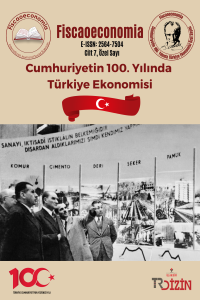Cumhuriyetin 100. Yılında Tarımda Kapitalist Üretim İlişkilerinin Dönüşümü
Transformation of Capitalist Production Relations in Agriculture in the 100th Century of the Republic
Author(s): Akif Dincer, Bahadır AydinSubject(s): National Economy, Agriculture, Economic history, Recent History (1900 till today), Economic development
Published by: Ahmet Arif Eren
Keywords: Agricultural Structures; Small Businesses; Incorporation in Agriculture; Turkish Agriculture; Capitalist Agriculture;
Summary/Abstract: The traces of capitalist transformation in Turkey’s agriculture can be traced back to the Ottoman Empire in the mid-19th century. In the Ottoman Empire, the development of large land ownership went hand in hand with the dispossession of small peasants, and the peasant class was reduced from being small producers to the status of farmers who cultivated the land in partnership or turned into wage laborers. In the second half of the 19th century, capitalist relations of production became evident with the beginning of production for the market. After the Republic, large land ownership played a leading role in political and economic decision-making processes and became the biggest obstacle to social change. In other words, it opposed the socialization of land and prevented the regulation of property and production relations in favor of the peasants. Large landowners, who remained in power until the 1960s and took advantage of mechanization, eliminated sharecropper forms of labor and replaced them with wage labor and land renting. In other words, this class, which eliminated the sharecropper peasants, turned to capitalist relations of production. Before 1980, large landowners were the biggest obstacle to the socialization of land and the transformation of property and production relations in favor of peasants. The 1980s and the post-1980s were the new periods in which different accumulation and distribution policies were adopted and neoliberal policies were imposed on the country. The neoliberal policies imposed on agriculture were implemented in two sub-periods, 1980-2000 and the post-2000s period, and were based on the liquidation of small producers in agriculture. In the 1980-2000 sub-period, liberalization and corporatization policies in agriculture were imposed by international institutions (IMF, WB, WTO) through various legal regulations. In the 2000 and later periods, it was brought to the agenda within the scope of EU accession negotiations and it was aimed to bring agricultural structures fully in line with EU standards. The main policy adopted to achieve EU standards was to eliminate small farmers and replace them with large-scale agricultural enterprises. Based on the historical process of the transformation of capitalist relations of production in Turkish agriculture, this study analyzes the changes in agricultural structures and land size by utilizing general agricultural censuses (1963, 1970, 1980, 1991, 2001) and the 2019 farmer registration system data.
Journal: Fiscaoeconomia
- Issue Year: 7/2023
- Issue No: spec. 1
- Page Range: 65-93
- Page Count: 29
- Language: Turkish

